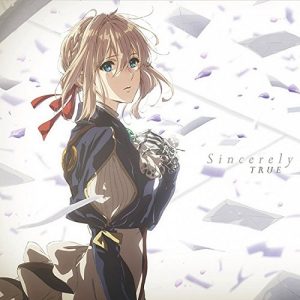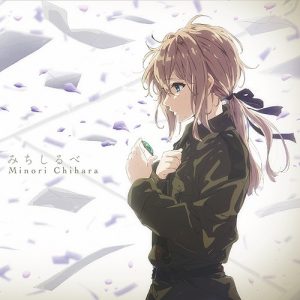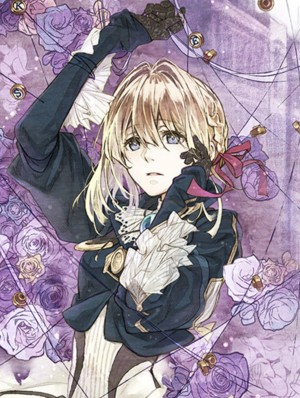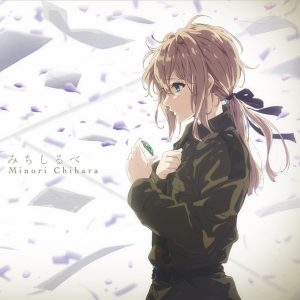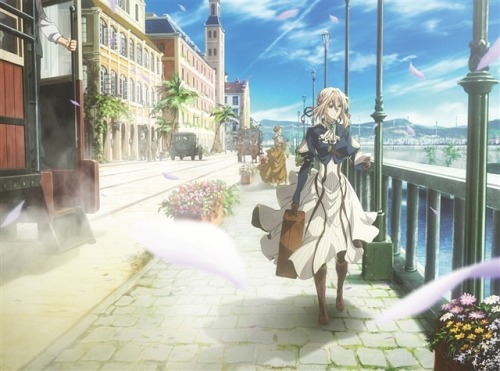
“I want to know. I love you.”
- Episodes : 13
- Genre : Drama, Fantasy, Slice of Life
- Airing Date : Jan. 11, 2018 - Apr. 11, 2018
- Producers : Kyoto Animation
Contains Spoilers
Violet Evergarden Introduction and Story
Violet Evergarden is a former child soldier, frozen in place as the world moves ahead. Violet’s metal hands are a constant reminder of her past, a war-torn era being left behind. Fulfilling a promise, former commander Hodgins visits and recruits her for a civilian company: CH Postal Service.
Violet’s attempts to settle into civilian life are uneasy, her military ways making the transition difficult. Then, she sees the work of an “Auto Memory Doll,” an occupation that writes letters for its clients. Caught by inspiration, she joins them, beginning her journey towards finding her new place in the world.
This Victorian-inspired setting is basked in sentiment. It stands between the romanticism of the letter and the tragedy of war. It cradles the emotions of its characters and then releases them restored.
So much of the show has an air of grandiosity. Its goal to elicit empathy is clear. Its visuals and emphasis on emotional swings are transparent and unapologetic. There’s so much feeling placed into the show that it’s overly sentimental--a dangerous line to tread, especially when the job of its protagonist is more than writing.
When a show emphasizes the written word, it’s not unrealistic for a viewer to expect amazing prose and execution. When a show markets itself as an adaptation of the only grand prize winner of the KyoAni award, a contest that has been running for 9 years (2009 - 2018), it’s not wrong to have high expectations. Yet the result was something different.
Words can betray so much. Behind their surface meaning, there exists subtext, the implicit and underlying message. It’s from this you find out intention; it’s from this you enter into a world of subtlety and nuance. A surface reading of any novel will betray you the most. It will give you the bare necessities: the literal but not the figurative.
A certain audience going into this show will feel confused--I include myself amongst them.
To watch Violet Evergarden this way--to focus too much on its dialogue or plot--is to ignore the strength of the medium, the audio-visual elements. Ignore the saying, “beauty is only skin deep.” Visual beauty in this medium is a controlled lens, a skilled process of connecting ideas that speak without words.
To say it simply, “the audio-visual elements of the show are the subtext.”
If you enjoy the show for its visuals, that’s not some mar on your name, and to re-contextualize, the show is my way of acknowledging it--to give it a fair chance.
And just as my expectations were reversed, so too were my feelings. My apprehensions about the show, my awareness of the pressure and critiques of its writing, and my hope for an earnest story--all changed. So let me state it clearly, in a similar fashion as the show.
I truly loved this show.
Against my expectations, this show gave me something I never knew I wanted: a return towards childhood idealism, an innocent and earnest belief that love could conquer all. For a show about writing, it was strangely focused on visuals.This show wanted to emphasize something else: sincerity over subtlety.
With this context, a lot of the directing makes sense. The overt camera shots, in particular, come to mind: Violet encased in a clock as her time ticks forward, the falling of leaves as a character passes away, the Elysian Fields reference, and the punctuating of episodes with the title, resonating the themes of the episode after it has ended.
A lot of these techniques, you’ve most likely seen in one show or another. The story itself isn’t exactly uncommon either. What then pushes this show past a simple cliché?
Timing.
Unlike in a book where timing takes place in our own minds, audio-visual mediums need to consider something fickle and fleeting. Time influences the delivery and execution of dialogue. Too quick a response and you can seem uncaring. Too slow and you might seem inattentive. Time also influences pacing, the careful delivery of which changes one’s understanding.
Yes, time. The very thing that thaws the heart and moves us into tomorrow.
Timing and all its nuance are handled wonderfully. With a rich musical composition by Evan Calls and the masterful sound direction of Yota Tsuruoka, the delivery of lines are conveyed through the rises, falls, and pauses of Violet Evergarden’s music.
Beats, specifically the acting/film term, is used to measure the introduction of new ideas and transitions in the script. The use of these beats is pronounced throughout the show with episode 7 being a superb example. In this episode, there is a scene where Oscar recounts his past. As he struggles to speak, a symphony of things are occurring.
First, his present-day self-acts as a narrator. As the scene reaches its midpoint, the narration stops after he speaks about his daughter’s parasol (beat). Next, the scene transitions with the daughter lifting her parasol, and his daughter speaks as if she were still alive (beat). At this moment, the music transitions into its melody, and the past Oscar speaks.
When the daughter states, “I’m going to walk across the lake. I promise you one day,” there is a pause (beat), an abrupt, stark transition to black, and the emergence of the vocals. Then we see his daughter dying from sickness.
He pushes himself away. He’s too close to the experience on screen, so Oscar’s narration returns and then continues: “Our days were quiet and warm (beat). But… (beat) my only hope… (beat) Why does God continue to take away what’s most precious to me (beat)?”
During this last sequence, there are deliberate pauses in the monologue (indicated by “beat”). The music supplements the scene with these pauses, transitioning to the fleeting plucks of the string instruments with the first beat. The camera transitions with the music, showing his lonely hand on the second beat.
His narration is now in the present day and time can move forward--there exists a response from Violet: “Parting with someone who is important to you (beat)… Never being able to see them again (beat)... I never knew it was so sad (beat)… and painful (beat).”
The structuring of this scene is a deliberate process. There is a method to how directors, composers, and actors help deliver scenes, and it is here that “symphony evokes sympathy.” Encased in each of these beats is so much effort from the audio-visual staff.
Music is timed perfectly to the visuals. The 1st beat transitions to her lonely hand. The second, a reactionary shot of Oscar. The third beat, a tear falls down her face. The fourth beat, a full portrait of her face. The last beat is indicated by a visual shot of the parasol, just as the music comes to an end.
So much of this sequence isn’t natural, but it’s through these sequences that this Violet Evergarden adaptation blossoms. Its grandiosity, its sentimental gestures, its clear need to tug at your emotions, all of this was never meant to be hidden.
Her iconic typewriter exemplifies her journey. From a tool conveying words to a piano for expressing emotions, Violet Evergarden is on a personal journey to becoming human.
What We Liked About Violet Evergarden
Without question, Violet Evergarden is a visual spectacle, one that feels like every episode is a sequence from a film. Mirroring this, the musical composition by Evan Calls and skillful sound directing of Yota Tsuruoka supplement an already luxurious production.
The production for Violet Evergarden is of a grand scale: 5 different languages, 7 episode directors, 10 different storyboard creators, and a multitude of Kyoto Animation talents such as Naoko Yamada and Yoshiji Kigami. To highlight the author Kana Akatsuki, the only grand prize winner of the KyoAni Awards, the animation studio went to every length to push forward this light novel adaptation.
Discussion Time
Violet Evergarden is an interesting adaptation. The insertion of 4 original episodes early on (episodes 2 - 5) are a meaningful change. These episodes remove the mystery behind Violet. Formerly, her past unveiled slowly. Her attachment to weapons tugged at reader curiosity but also separated her. She was an isolated figure, someone hard to grasp and understand--someone hard to empathize with early on.
The adaptation changes this with these original episodes and presents the book chapters in streamlined order. Doing so changes the interpretation of the work. Kyoto Animation wanted to stylize the story with its visuals and give the episodic chapters of the book a unifying theme: the humanizing of characters through empathy.
Why You Should Watch Violet Evergarden
Violet Evergarden has plenty of reasons to watch it: the visual display, the expert direction of its sound, and the decisions that went into adapting the novel. Looking through the main staff members, you’ll notice a lot of them were involved with famous KEY stories: Kanon, Air, Clannad.
There’s a ton of talent behind Violet Evergarden, and if you’re there for the emotional or technical appeal, then the show is worth your time.
What's so appealing about this piece of work.
Without question, Violet Evergarden is a visual spectacle, one that feels like every episode is a sequence from a film. Mirroring this, the musical composition by Evan Calls and skillful sound directing of Yota Tsuruoka supplement an already luxurious production.
The production for Violet Evergarden is of a grand scale: 5 different languages, 7 episode directors, 10 different storyboard creators, and a multitude of Kyoto Animation talents such as Naoko Yamada and Yoshiji Kigami. To highlight the author Kana Akatsuki, the only grand prize winner of the KyoAni Awards, the animation studio went to every length to push forward this light novel adaptation.
1. The Visual Splendor and Various Directing Styles
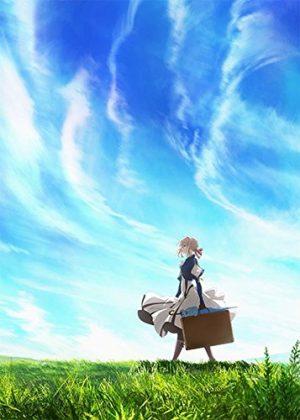
To highlight the episodic nature of the novels, Kyoto Animation brought on a wealth of talent. If identifying different directing styles is your thing, then Violet Evergarden transitions between 7 episode directors. However, if the technical elements are not as inviting, the animation is truly marvelous. It’s instantly recognizable how much time and money went into this show.
2. An Incredible Soundtrack, Superb Sound Directing, and Multiple Languages
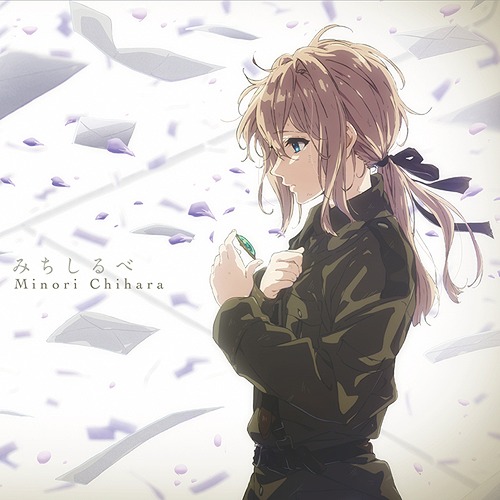
It’s not often that I wholeheartedly shine attention on the audio elements. To not do so here would be a huge disservice. If you’ve ever been curious about how different languages dub anime, then Violet Evergarden has 5: English, Spanish, Japanese, French, and German. The original Japanese has an excellent sense of timing, and the show thrives off of its musical score and the expert timing of its dialogue. If your interest is on the more audio-oriented side of shows, then Violet Evergarden should be at the top of your priority.
3. An Interesting Adaptation of Original Episodes
Original material is certainly a feature of this adaptation. The changes to the story are like ripples in a lake. The four original episodes introduce new characters who help expand the scope of the world. In the same ways Violet speaks for these characters, they return the favor in later episodes.
The decisions to adapt the story in a different order, highlight certain traits of the original story and the inclusion of these new characters emboldens Violet in a different light. While this might not be agreeable to every viewer, the decision making behind these differences are still intriguing.
Why You Should Skip Violet Evergarden
Those who want a closer adaptation of the light novels might feel mixed about this work. Cutting certain scenes and chapters from the source material is common in adaptations, but the result is a very different Violet Evergarden. The later parts of the adaptation also take a staunchly different tone, choosing to emphasize the war setting prevalent in the novels.
1. A Very Different Violet
I’ll be cautious about explaining this if you plan to read the books. For some, the decisions to cut certain chapters and scenes from the light novels can be disheartening. If your interest in the protagonist was more of her mysterious side, the action-oriented scenes, or the darker tone of certain chapters in the novel, you’ll be left wanting more.
2. A Change in Tone
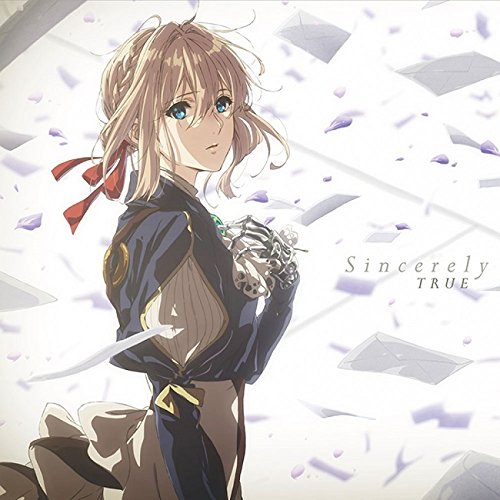
It would be an understatement to say the original novels had an interest in war. Passages to explain the strategies of later battles or the technology through which soldiers use are absent in the anime adaptation. Those more focused on the sentimental, episodic tale of characters--the majority of the show--will find the last few episodes a strange departure.
Final Thoughts
There are plenty of ways to watch Violet Evergarden, and although it won’t appeal to everyone, I think the magnitude of this work and the amount of talent Kyoto Animation brought to Violet Evergarden is more than worth your time. Whatever your interest in Violet Evergarden might be, I hope this review helped highlight the appeal of the show.
Recommended Post
6 Anime Like Violet Evergarden [Recommendations]
Recommended Post


